B 9 unit 4 Exploring Plants Learning About Language[上学期]
文档属性
| 名称 | B 9 unit 4 Exploring Plants Learning About Language[上学期] |
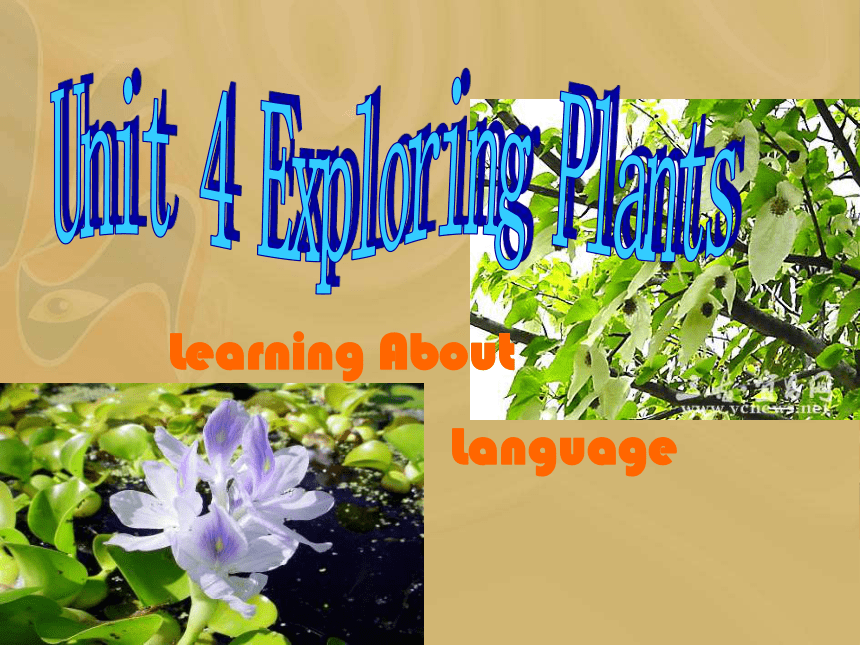
|
|
| 格式 | rar | ||
| 文件大小 | 410.9KB | ||
| 资源类型 | 教案 | ||
| 版本资源 | 人教版(新课程标准) | ||
| 科目 | 英语 | ||
| 更新时间 | 2006-11-09 19:03:00 | ||
图片预览

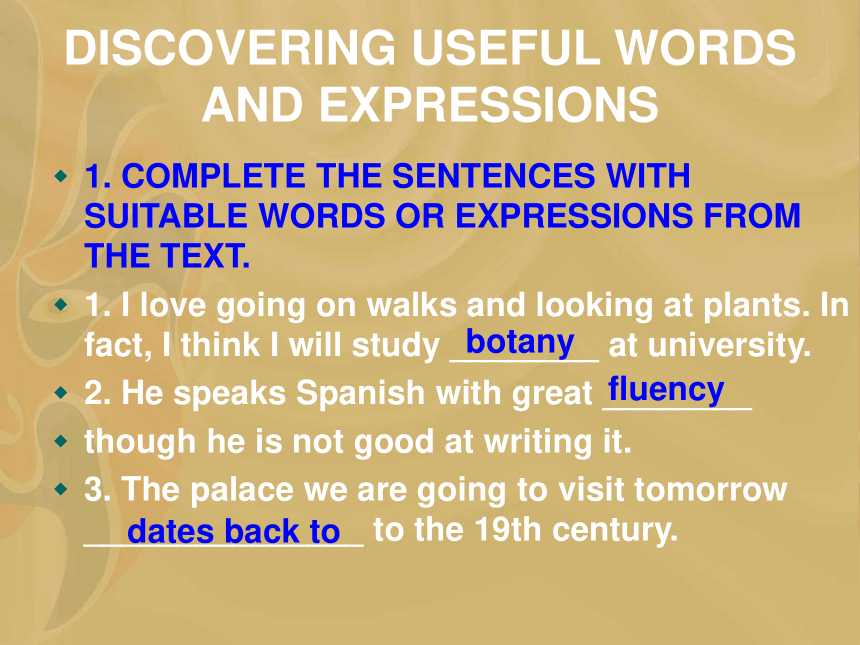
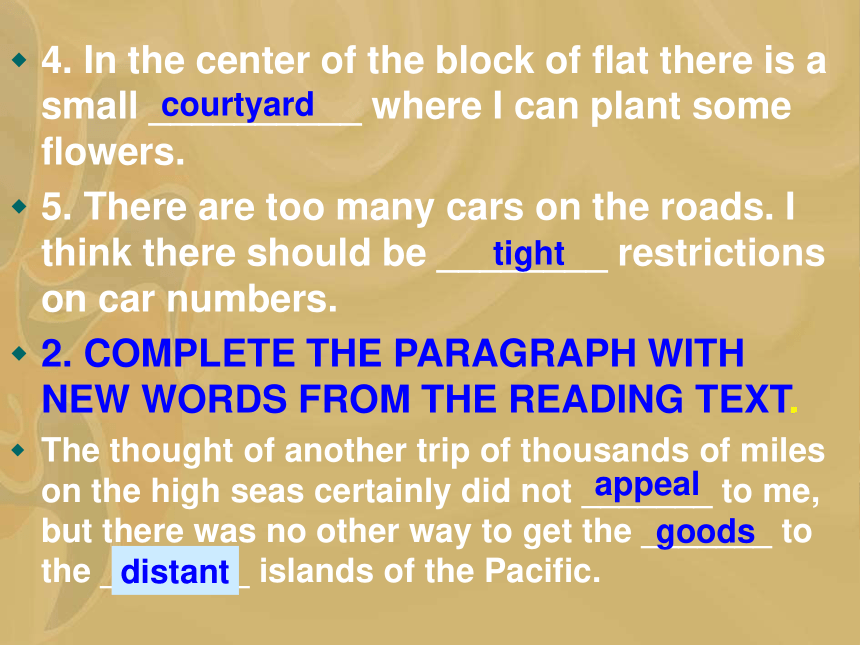
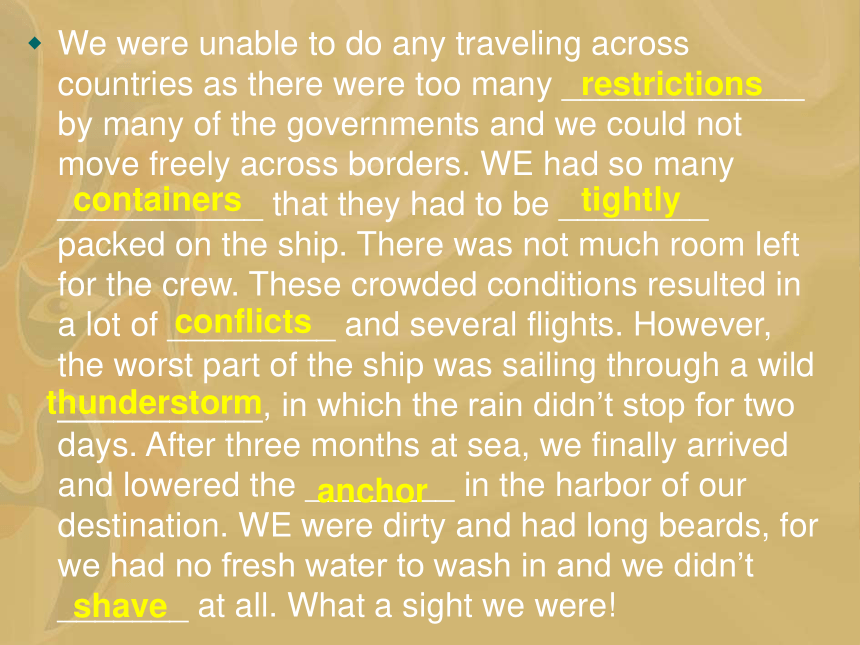
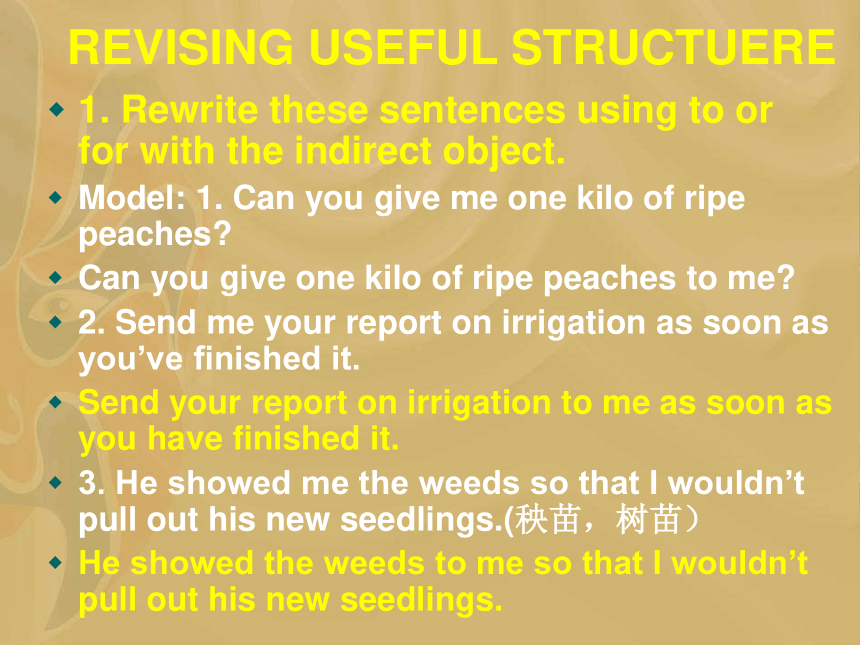
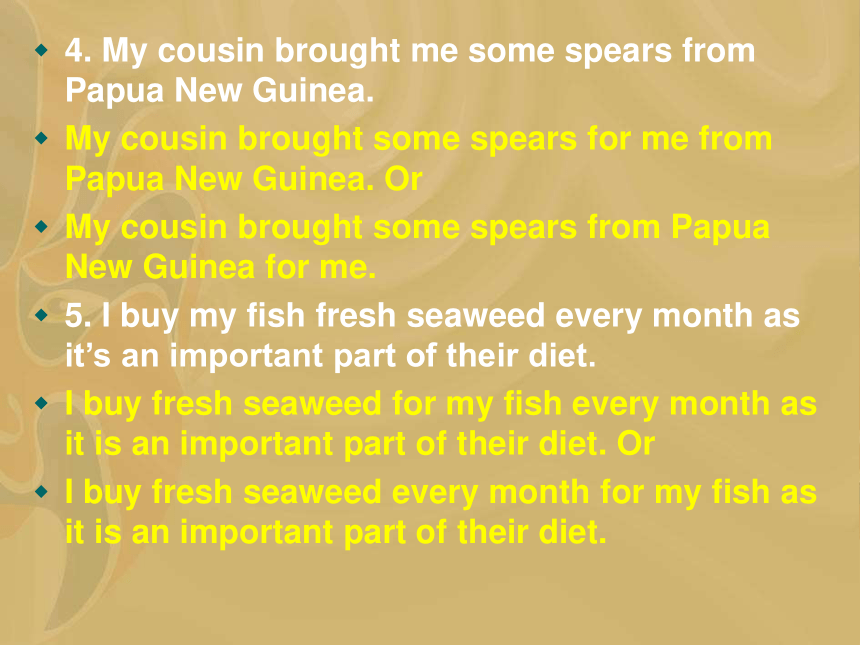
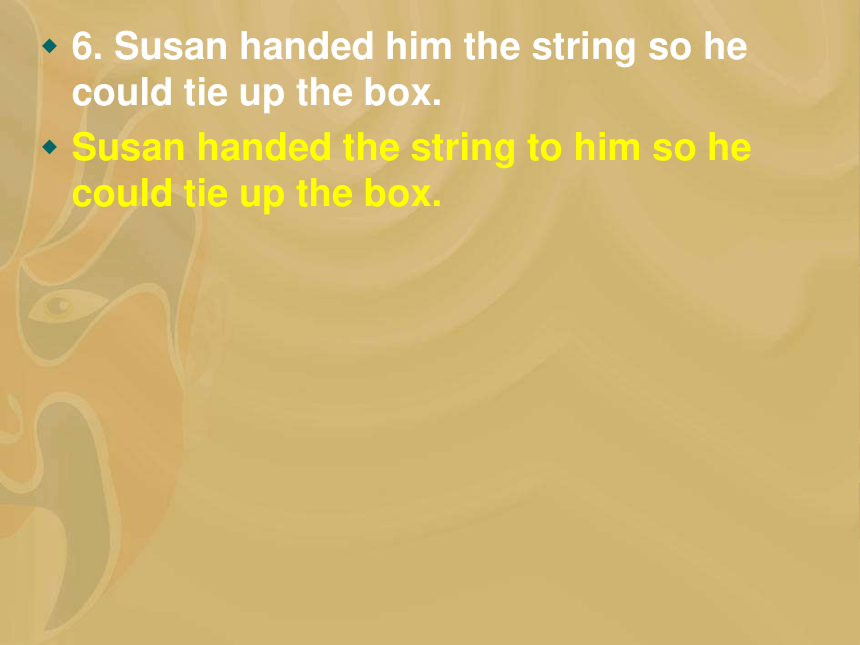
文档简介
课件19张PPT。Unit 4 Exploring PlantsLearning About
LanguageDISCOVERING USEFUL WORDS AND EXPRESSIONS1. COMPLETE THE SENTENCES WITH SUITABLE WORDS OR EXPRESSIONS FROM THE TEXT.
1. I love going on walks and looking at plants. In fact, I think I will study ________ at university.
2. He speaks Spanish with great ________
though he is not good at writing it.
3. The palace we are going to visit tomorrow _______________ to the 19th century.botanyfluencydates back to4. In the center of the block of flat there is a small __________ where I can plant some flowers.
5. There are too many cars on the roads. I think there should be ________ restrictions on car numbers.
2. COMPLETE THE PARAGRAPH WITH NEW WORDS FROM THE READING TEXT.
The thought of another trip of thousands of miles on the high seas certainly did not _______ to me, but there was no other way to get the _______ to the ________ islands of the Pacific.
courtyardtightappealgoodsdistantWe were unable to do any traveling across countries as there were too many _____________ by many of the governments and we could not move freely across borders. WE had so many ___________ that they had to be ________ packed on the ship. There was not much room left for the crew. These crowded conditions resulted in a lot of _________ and several flights. However, the worst part of the ship was sailing through a wild ___________, in which the rain didn’t stop for two days. After three months at sea, we finally arrived and lowered the ________ in the harbor of our destination. WE were dirty and had long beards, for we had no fresh water to wash in and we didn’t _______ at all. What a sight we were!restrictionscontainerstightlyconflictsthunderstormanchorshaveREVISING USEFUL STRUCTUERE1. Rewrite these sentences using to or for with the indirect object.
Model: 1. Can you give me one kilo of ripe peaches?
Can you give one kilo of ripe peaches to me?
2. Send me your report on irrigation as soon as you’ve finished it.
Send your report on irrigation to me as soon as you have finished it.
3. He showed me the weeds so that I wouldn’t pull out his new seedlings.(秧苗,树苗)
He showed the weeds to me so that I wouldn’t pull out his new seedlings.4. My cousin brought me some spears from Papua New Guinea.
My cousin brought some spears for me from Papua New Guinea. Or
My cousin brought some spears from Papua New Guinea for me.
5. I buy my fish fresh seaweed every month as it’s an important part of their diet.
I buy fresh seaweed for my fish every month as it is an important part of their diet. Or
I buy fresh seaweed every month for my fish as it is an important part of their diet.6. Susan handed him the string so he could tie up the box.
Susan handed the string to him so he could tie up the box.
Two objects通常为 “间接宾语+直接宾语” He doesn't own me anything. She asked me whether I had been there before. I warned you he would be late. Give me it./Give it to me. They told us where to shop cheaply.间接宾语后移, 间接宾语用to 或for 引出: They give it to John. He sold his old car to one of his neighbours. I have bought some chocolate for you. Give the dictionary to me, please.用to侧重指动作的方向, 表示朝着, 向着, 对着某人。
用for 侧重指动作的受益者, 表示为了某人, 替某人。
常跟双宾语的动词分类总结:需借助to的: bring, give, lend, hand, offer, pass, pay, promise, read, return, send, show, teach, tell, ask, leave, mail, throw, take, write,等。
需借助for的: build, buy, call, change, cook, choose, do, draw, envy, fetch, find, forgive, gain, get, make, order, play (演奏), sing, save, spare, win等。e.g. Our teacher explains to us the difficult points in the unit.
We disclosed to them the secret of our invention.
They expressed to their teacher their conviction that the experiment was true.
The guide is describing the scenic spots to the tourists.ExercisesFill in the blanks using “to” or “for”.
1) Fifty dollars was advanced __ him on his salary before the work was done.
2) You should never serve beef __ a Hindu.toto3) You’d better do your best but prepare yourself ___ the worst.
4) I’ll send a postcard __ you while I am away on holiday.
5) You come up to the City Hall tonight and I’ll fix things ___you.
forforto admit 承认 appreciate 感激,赞赏 avoid 避免 complete 完成 consider 认为 delay 耽误 deny 否认 detest 讨厌 endure 忍受 enjoy 喜欢 escape 逃脱 prevent阻止 fancy 想象 finish 完成 imagine 想象 mind 介意 miss 想念 postpone 推迟 practise 训练 recall 回忆 resent 讨厌 resist 抵抗 resume 继续 risk 冒险 suggest 建议 face 面对 include 包括 stand 忍受 understand 理解 forgive 宽恕 keep 继续
动词后加动名词doing作宾语( V. + doing sth)2. Complete the sentences using the ing-form or the infinitive of the verb as the object.
1. Barbara learned ______________when her uncle came to visit her family last summer. (ride/horses)
2.enjoy____________________________________________(read, cartoons) though I don’t quite understand what they are about.
to ride a horsereading these cartoons from foreigncountries3. Jim and Mandy both denied ___________________________________. (see/ car key)
4. I expect __________________________ this year. (spend/holidays/France)
5. Charlie regretted
___________________________________.
(invite/Joseph/party)
6. Jack finally agreed
___________________________________. (apologize/ broken spade) having seen/ seeing the car key/keys.having invited/ inviting Joseph to the partyto spend my holidays in Franceto apologize to us for the broken spade.3. Each sentence below contains one mistake. Find the mistake and correct it.1. Could you begin by telling what you were doing at 9:30 on the evening of the 13th April?
2. My parents suggested to postpone our visit to the pyramids because we didn’t have enough time to see them before we left Egypt.
3. Please stop interrupting to me when I’m explaining something.∧me___________postponing/4. IN the morning the hunter showed me the way how to get to the track down the mountain.
5. He admitted me that he had done something wrong.
6. I will report them the kind of monument we are planning to build for the soldiers.
______________how to get/ the way∧to∧to
LanguageDISCOVERING USEFUL WORDS AND EXPRESSIONS1. COMPLETE THE SENTENCES WITH SUITABLE WORDS OR EXPRESSIONS FROM THE TEXT.
1. I love going on walks and looking at plants. In fact, I think I will study ________ at university.
2. He speaks Spanish with great ________
though he is not good at writing it.
3. The palace we are going to visit tomorrow _______________ to the 19th century.botanyfluencydates back to4. In the center of the block of flat there is a small __________ where I can plant some flowers.
5. There are too many cars on the roads. I think there should be ________ restrictions on car numbers.
2. COMPLETE THE PARAGRAPH WITH NEW WORDS FROM THE READING TEXT.
The thought of another trip of thousands of miles on the high seas certainly did not _______ to me, but there was no other way to get the _______ to the ________ islands of the Pacific.
courtyardtightappealgoodsdistantWe were unable to do any traveling across countries as there were too many _____________ by many of the governments and we could not move freely across borders. WE had so many ___________ that they had to be ________ packed on the ship. There was not much room left for the crew. These crowded conditions resulted in a lot of _________ and several flights. However, the worst part of the ship was sailing through a wild ___________, in which the rain didn’t stop for two days. After three months at sea, we finally arrived and lowered the ________ in the harbor of our destination. WE were dirty and had long beards, for we had no fresh water to wash in and we didn’t _______ at all. What a sight we were!restrictionscontainerstightlyconflictsthunderstormanchorshaveREVISING USEFUL STRUCTUERE1. Rewrite these sentences using to or for with the indirect object.
Model: 1. Can you give me one kilo of ripe peaches?
Can you give one kilo of ripe peaches to me?
2. Send me your report on irrigation as soon as you’ve finished it.
Send your report on irrigation to me as soon as you have finished it.
3. He showed me the weeds so that I wouldn’t pull out his new seedlings.(秧苗,树苗)
He showed the weeds to me so that I wouldn’t pull out his new seedlings.4. My cousin brought me some spears from Papua New Guinea.
My cousin brought some spears for me from Papua New Guinea. Or
My cousin brought some spears from Papua New Guinea for me.
5. I buy my fish fresh seaweed every month as it’s an important part of their diet.
I buy fresh seaweed for my fish every month as it is an important part of their diet. Or
I buy fresh seaweed every month for my fish as it is an important part of their diet.6. Susan handed him the string so he could tie up the box.
Susan handed the string to him so he could tie up the box.
Two objects通常为 “间接宾语+直接宾语” He doesn't own me anything. She asked me whether I had been there before. I warned you he would be late. Give me it./Give it to me. They told us where to shop cheaply.间接宾语后移, 间接宾语用to 或for 引出: They give it to John. He sold his old car to one of his neighbours. I have bought some chocolate for you. Give the dictionary to me, please.用to侧重指动作的方向, 表示朝着, 向着, 对着某人。
用for 侧重指动作的受益者, 表示为了某人, 替某人。
常跟双宾语的动词分类总结:需借助to的: bring, give, lend, hand, offer, pass, pay, promise, read, return, send, show, teach, tell, ask, leave, mail, throw, take, write,等。
需借助for的: build, buy, call, change, cook, choose, do, draw, envy, fetch, find, forgive, gain, get, make, order, play (演奏), sing, save, spare, win等。e.g. Our teacher explains to us the difficult points in the unit.
We disclosed to them the secret of our invention.
They expressed to their teacher their conviction that the experiment was true.
The guide is describing the scenic spots to the tourists.ExercisesFill in the blanks using “to” or “for”.
1) Fifty dollars was advanced __ him on his salary before the work was done.
2) You should never serve beef __ a Hindu.toto3) You’d better do your best but prepare yourself ___ the worst.
4) I’ll send a postcard __ you while I am away on holiday.
5) You come up to the City Hall tonight and I’ll fix things ___you.
forforto admit 承认 appreciate 感激,赞赏 avoid 避免 complete 完成 consider 认为 delay 耽误 deny 否认 detest 讨厌 endure 忍受 enjoy 喜欢 escape 逃脱 prevent阻止 fancy 想象 finish 完成 imagine 想象 mind 介意 miss 想念 postpone 推迟 practise 训练 recall 回忆 resent 讨厌 resist 抵抗 resume 继续 risk 冒险 suggest 建议 face 面对 include 包括 stand 忍受 understand 理解 forgive 宽恕 keep 继续
动词后加动名词doing作宾语( V. + doing sth)2. Complete the sentences using the ing-form or the infinitive of the verb as the object.
1. Barbara learned ______________when her uncle came to visit her family last summer. (ride/horses)
2.enjoy____________________________________________(read, cartoons) though I don’t quite understand what they are about.
to ride a horsereading these cartoons from foreigncountries3. Jim and Mandy both denied ___________________________________. (see/ car key)
4. I expect __________________________ this year. (spend/holidays/France)
5. Charlie regretted
___________________________________.
(invite/Joseph/party)
6. Jack finally agreed
___________________________________. (apologize/ broken spade) having seen/ seeing the car key/keys.having invited/ inviting Joseph to the partyto spend my holidays in Franceto apologize to us for the broken spade.3. Each sentence below contains one mistake. Find the mistake and correct it.1. Could you begin by telling what you were doing at 9:30 on the evening of the 13th April?
2. My parents suggested to postpone our visit to the pyramids because we didn’t have enough time to see them before we left Egypt.
3. Please stop interrupting to me when I’m explaining something.∧me___________postponing/4. IN the morning the hunter showed me the way how to get to the track down the mountain.
5. He admitted me that he had done something wrong.
6. I will report them the kind of monument we are planning to build for the soldiers.
______________how to get/ the way∧to∧to
